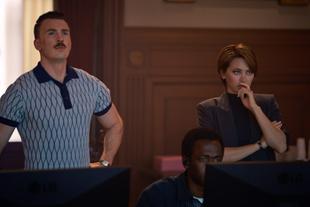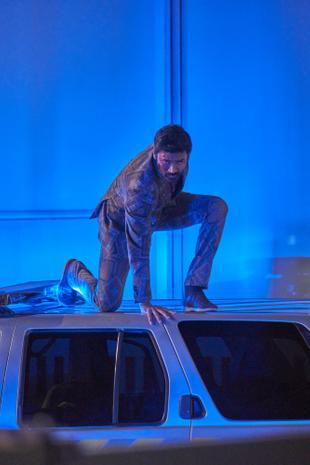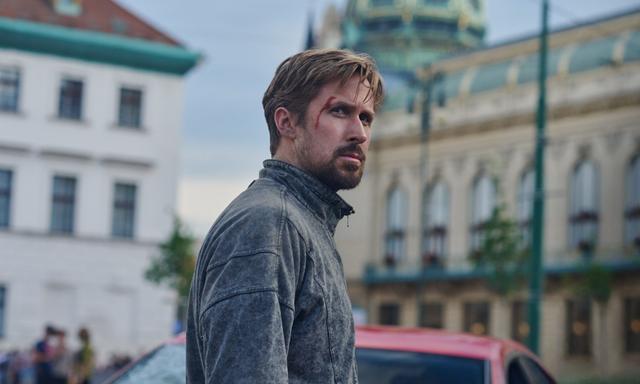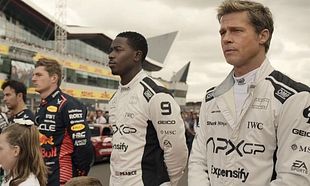Netflix have positioned ‘The Gray Man’ as their big summer blockbuster that aims to capture the same summer blockbuster spirit as the likes of ‘Men In Black’ or ‘Point Break’ – and by all accounts, they have backed the wrong horse.
‘The Gray Man’ is the latest film from The Russo Brothers, and their biggest budgeted film since they redefined modern cinema with the two most recent ‘Avengers’ films.
Industry reports have ‘The Gray Man’ budgeted at $200 million, and it is very difficult to tell where any of this money went.
Bar one OK Prague-set action scene that was in the trailer, ‘The Gray Man’ could have been made by any director for a price much cheaper than $200 million.
The Russo Brothers can do action, with the pair hired by Kevin Feige to direct ‘Captain America: The Winter Soldier’ after their paintball episodes of ‘Community’, but there is very little here to justify the price tag.
In a summer where 'RRR’ and ‘Top Gun: Maverick’ flipped the script on what audiences expect from action movies, ‘The Gray Man’ feels like a movie out of step with the times.
'Ambulance' showed how you could take a simple premise and make it as absurdly enjoyable as possible and was designed to be seen on the biggest screen you could find.
'The Gray Man' feels strangely conservative in comparison.
Ryan Gosling has returned from a near 4-year hiatus to lead this flick, with Chris Evans serving as his mirror, but the film runs into a problem straight away; ‘The Gray Man’ is infinitely more interesting if the roles are switched.
Ryan Gosling as the stoic action man on the run is an interesting casting choice on paper, there isn’t enough done to make the viewer care about him.
Chris Evans is having good fun as the unhinged mercenary leader tasked with taking out Gosling, but the casting of Evans in this role works against it considering we know Evans as the all-conquering Captain America.
Evans has a good streak in playing assholes as the likes of ‘Knives Out’ and ‘Scott Pilgrim’ have proven, but Evans in the bad guy role here feels like casting against type for the sake of it.
The film tries to wring a lot of tension out of us asking to root against Chris Evans, but it falls flat.
Gosling in action man mode is passable, but nothing more.
Make Gosling the unhinged baddie, and the film is actually worth talking about.
Ana De Armas, who lit up the screen in ‘No Time To Die’ last year, is given very little of what made her pop in the James Bond adventure, and is instead relegated to the most tedious of action film roles, the stoic action woman that can mask emotion.
When the film digs deeper into the bench, with ‘Bridgerton’ star Réne Jean-Page and ‘The Matrix Resurrections’ star Jessica Henwick as notable examples, the film flirts with being interesting.
Henwick, in particular, is the star of a much more interesting film, and the film keeps her sidelined for too long.

The Russo Brothers brought over their worst habit from the MCU – it is not merely enough to let an action scene sit, a character has to make a glib one-liner to undercut the tension.
Comedy in action films is a very fine balancing act – too serious, and you become a ‘Bourne’ film, too silly, and you become ‘The Naked Gun’ – but ‘The Gray Man’ can never decide what it wants to be.
‘The Gray Man’ easily could have been made in 1992 with someone like Stallone or Schwarzenegger in the lead role, and the core premise of two freakishly strong action men facing off is appealing, but ‘The Gray Man’ is as enjoyable as paying a utility bill.
If ‘The Gray Man’ was made in 1992, it would have remembered to have been fun.
Instead, ‘The Gray Man’ looks and feels like a video game from 2010, with barely a memorable moment to it.
Christopher McQuarrie’s spin on the ‘Mission Impossible’ franchise has been to make Tom Cruise the living embodiment of good luck and placing him in increasingly absurd situations that you want to see play out.
There is a sense of escalation in the ‘Mission Impossible’ movies from set-piece to set-piece that keeps you on your toes, and the only thing ‘The Gray Man’ keeps doing is making you reach for your phone to check Instagram.
Incidentally, McQuarrie was attached to direct the film at one stage, and if you’ve seen the last two ‘Mission Impossible’ movies you’ll be fully aware of how he can take the simplest of concepts and make it a masterclass in tension.
The Russo Brothers are no McQuarrie, nor indeed are they their often-cited inspirations Pollack or Pakula.
There are a few instances of the camera suddenly going into a Sam Raimi style swooping shot, and these little flourishes are signs of the flashy action film ‘The Gray Man’ should be.
There is a good supporting cast here, and the film briefly comes alive for all of 5 minutes when Indian superstar Dhanush shows up and puts a bit of colour in the films cheeks.
In his one big action scene, there is a sense of threat and physicality, and you’d much rather be watching the film starring him.
Dhanush is in all of 3 scenes and the film just forgets about him, which is an egregious waste of talent.
Having a star like Dhanush on the bench makes as much sense as Sir Alex Ferguson keeping Eric Cantona on the bench because he wants to play defensively.

Billy Bob Thornton earns the “And” credit, and we’re reminded why he was such an interesting and unusual star in his prime, with his blend of emotion and grit making his character more interesting than he was on the page.
There is a more interesting film somewhere in 'The Gray Man', and the core concept of a man on the run being chased by an evil mirror version of himself is a good action movie plot, but 'The Gray Man' is toast with no butter.
All told, ‘The Gray Man’ is background noise and not the bombastic summer blockbuster Netflix thinks it is.
In recent weeks, rumblings from the company have indicated they will be giving less money to the likes of Martin Scorsese or other auteur-driven films and focusing on crowd-pleasers like 'Red Notice' and 'The Gray Man'.
If Netflix plans on giving films like 'The Gray Man' big budgets instead of auteur-driven projects, 'The Gray Man' may well have the same reputation as 'Hello, Dolly!' in the annals of Hollywood history.
For those unversed in film history, the failure of 'Hello, Dolly!' helped speed up the demise of the post-war Hollywood musical, and indirectly lead to the New Hollywood wave of the 1970s.
'Hello, Dolly!' was such a bloated and over-budgeted mess that producing musicals at the same level simply became untenable for Hollywood.
In Netflix's case, giving such a nothing movie like 'The Gray Man' a big budget doesn't exactly scream good financial judgment.
Netflix is in such a precarious position that it can't afford to have their big-budget films bomb, and 'The Gray Man' may well be the film that ends the era of Netflix handing out unlimited budgets as they look to tighten their belts.
'The Gray Man' is the kind of misfire that should require serious soul-searching at Netflix - is sinking this much money into a mediocre movie worth the cost?





















































































